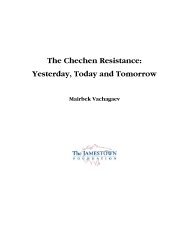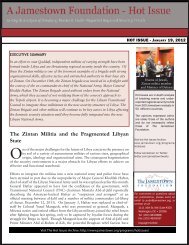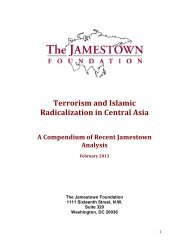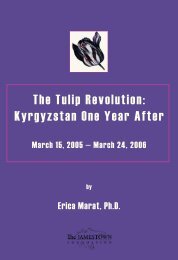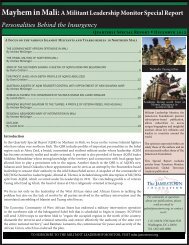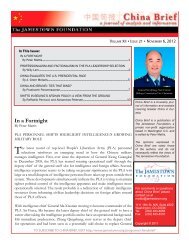By Brian Glyn Williams - The Jamestown Foundation
By Brian Glyn Williams - The Jamestown Foundation
By Brian Glyn Williams - The Jamestown Foundation
You also want an ePaper? Increase the reach of your titles
YUMPU automatically turns print PDFs into web optimized ePapers that Google loves.
preceding the Polish army's arrival. His greatest mistake was to send the Crimean Tatars, whose army<br />
was of roughly the same size as that of the Poles, to block the Polish advance. <strong>The</strong> Khan's forces were<br />
unwilling to take on this army in combat. Kurat claims that even if they had been so inclined they were not up<br />
to the task of defeating the heavy Polish cavalry which had artillery support. 138 <strong>The</strong> Khan's hostile feelings<br />
toward the Grand Vezir may have also influenced the Tatars' decision to avoid combat with Sobieski's<br />
forces.<br />
In the Tatars' defense, it should be noted that the Polish advance was hindered by supply problems caused by the<br />
fact that much of the territory on the route to Vienna had been ravaged by the Tatar chambuls. Despite this<br />
difficulty, Sobieski was able to arrive in the hills outside Vienna by the second week of September. Offensive<br />
operations were quickly carried out in coordination with the Austrian forces under the command of the Duke<br />
of Lorraine. Both Sobieski and the Duke agreed on making a heavy charge into the enemy’s camp, which<br />
had not been adequately prepared for a surprise assault.<br />
<strong>The</strong> ensuing charge won Sobieski fame throughout Europe and succeeded in completely crushing Kara<br />
Mustafa's army. A Tatar force struck a blow at the attacking force, but this had little effect on the Christians'<br />
progress. <strong>By</strong> the end of the day the Ottoman army was in full retreat toward the Hungarian border. <strong>The</strong><br />
victorious Christians were too shocked to give chase and appear to have considered the Ottoman retreat<br />
to have been a feigned maneuver to draw them out of position. Had the Christians reacted quicker,<br />
they might have been able to completely annihilate Kara Mustafa's army. As it was, the Ottomans were<br />
able to retreat with comparatively few losses. 139<br />
<strong>The</strong> inability of the crusaders to follow up on this victory cost Austria dearly. One contemporary<br />
source claims<br />
that the Crimean Tatars alone were able to make off with some 80,000 captives after the defeat. This excess<br />
baggage does not, however, seem to have slowed down the Tatars who proceeded the main army in flight<br />
by a full 24 hours. 140 <strong>The</strong> enraged Austrians actually considered striking at the distant Crimea in retaliation<br />
for travesties committed by the Tatars in Austria but their forces were clearly not up to the task.<br />
<strong>The</strong> victorious Christian allies were, however, capable of carrying the war into neighboring Hungary with a<br />
vengeance. <strong>By</strong> the end of the campaign season the Emperor's forces had succeeded in pushing the<br />
demoralized Ottomans out of Hungary. In the following year, the Porte was confronted by a<br />
Christian alliance that now included Venice, and the Ottomans were forced to defend their borders from<br />
Poland to the Mediterranean. <strong>The</strong> Tatars served with distinction against the Poles during these defensive<br />
wars crushing a Polish offensive in 1687 and defeating a Polish army attempting to conquer Moldavia<br />
on another occasion. 141<br />
In 1688, the Tatars assisted the retreating Ottomans on several occasions. In this year Selim Giray Khan<br />
defeated an Austrian force in the battle of Kapchak and in the following year this same Khan helped<br />
drive the Imperials from the Belgrade vicinity. 142 In 1689, Kurat claims that the arrival of Selim Giray's troops<br />
on the Habsburg front saved Bulgaria and Thrace from Austrian conquest. 143 Howorth mentions that six<br />
years later the Tatars:<br />
contributed greatly to the capture of the towns of Lugos, Nissa, and Belhn, and took an active<br />
part in the terrible struggle for Lippa, where the Imperial general Frederick Veterani and<br />
so many of his men were killed. 144<br />
34



